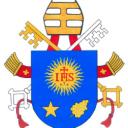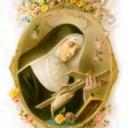Yahoo Answers is shutting down on May 4th, 2021 (Eastern Time) and beginning April 20th, 2021 (Eastern Time) the Yahoo Answers website will be in read-only mode. There will be no changes to other Yahoo properties or services, or your Yahoo account. You can find more information about the Yahoo Answers shutdown and how to download your data on this help page.
Trending News
Where in The Bible does it say "Jesus founded the Catholic Church"?
I'm just curious because I often hear Catholics say "We belong to Jesus's church". I happen to attend a Baptist Church and believe I am just as much a child of Christ as any Catholic. I accept all Catholics as brothers in Christ (even though I disagree with much, like the kneeling before statues of Mary etc.) but it seems the feeling is not mutual with Catholics. Why?
I dont believe Jesus cares where you pray or what denomination you are in. As long as you follow The Holy Bible you are saved. I don't get this whole "Catholic Church is the REAL Church!!" stuff...I mean, please...
Schmood, Martin Luthor eliminated The Apocrypha (spelling?) because it was never supposed to be in The Bible to begin with. It was never canonized nor does it relate to any passages in The Bible where as all other passages relate to each other. Yet the Catholics have kept it in "their" Bible. That's cool with me but I just don't agree with it because I think it never belonged there to begin with.
Go Catholic,
When will Catholics "get it" that Jesus founded NO CHURCH. HE is the rock, not your building. Not your pope. JESUS CHRIST HIMSELF is "The Rock".
This is why I'm not Catholic. You place greater value on your Church than you do The Holy Bible. Hey look, I just founded a Church THIS SECOND! "Todd's Church". Guess what? If I follow Jesus and The Bible I am STILL saved! Imagine that!
42 Answers
- Tim 47Lv 71 decade agoFavorite Answer
The Bible says that there is one church. Catholics think that theirs is it.
- MakemeasparkLv 71 decade ago
Jesus spent time appointing Apostles and a leader for the Apostles, Peter. He taught them all they would need to know to lead His people. Notice that some of his followers were only Disciples and some were apostles. In Acts you read how the hand picked leaders of the Church appointed Deacons, and Bishops are mentioned later in Acts. Paul gives some further instructions about how these various parts of the Leadership should be chosen in future.
There is the foundation of what later was called the "Christian" Church, and some time after that this church was called the Universal Church(Christian was assumed, perhaps because other groups did not use the term church). Universal means Catholic, or Catholic means Universal.
I would actually say that the Catholic and Orthodox churches together are the actual original church founded by Jesus. There was only one Church until 1054.
May I respectfully request that you find out when and where your denomination was founded and how it got started?
Just as a bonus, in answer to an early answerer here:
Where Scriptural basis for confirmation? Hebrew 6: 2
What is their Scriptural basis for infant baptism? Hebrews 6:2
What is their scriptural basis for lent? Matthew 4:2 KJV
And when he had fasted forty days and forty nights, he was afterward an hungred.
Luke 4:2 KJV
Being forty days tempted of the devil. And in those days he did eat nothing: and when they were ended, he afterward hungered.
Mark 1:13
And he was there in the wilderness forty days, tempted of Satan; and was with the wild beasts; and the angels ministered unto him.
What is their Scriptural basis for Ash Wednesday? Psalm 103: 14
What is their Scriptural basis for the rosary?
Luke Chapter 1
Where does it say-"be baptised & repent" in the Bible?
Mark 16:16
Whoever believes and is baptized will be saved, but whoever does not believe will be condemned.
Where is the word "pope" in the Bible? The word Pope just means Papa in Italien, The Pope is actually just the Bishop of Rome which makes him the head Bishop so to speak.
Where is the word "catholic" in the Bible? In the bible the word Catholic does not appear because it just means Universal.
Where is Peter listed as the first "bishop" of Rome in the Bible? Peter did not go to Rome until after Jesus Ascended.
- ♛Qu€€n♛J€§§¡¢a♛™Lv 51 decade ago
You know darned well that the Bible doesn't say specifically "Jesus founded the Catholic Church." What it DOES state is how Jesus told Saint Peter that he was the rock upon which he builds his Church. That effectively made Peter the first Pope, in the unbroken line of Popes ever since.
Some people will tell you that Constantine is the founder of the Roman Catholic Church, and he did indeed have a hand in popularizing Christianity, but Saint Peter is technically the founder of the Church. All other denominations spring from the Roman Catholic Church, including your own.
- Danny HLv 61 decade ago
There are many places in the bible that show the Catholic Church as the original Church founded by Christ. However, you also have to study Christian history. The reason is because the Church existed before the bible, not the other way around. Jesus died in 33AD, rose and went to heaven. It wasn’t until about 20 or so years later that the first few letters that would be New Testament writings came into being (Thessalonians being the first). The last books to be written didn’t find their way onto the page until nearly 100 AD. By those numbers, we didn’t have a completed New Testament until nearly 70 years after Christ’s death, and more correctly, it wasn’t until around 400AD when the bible was canonized. So then, given the history of the bible’s development, how was the faith learned, taught and passed down during those pre-bible years? Additionally, the Catholic Church was the ONLY Christian church in existence at that time, and it was Her that canonized the bible. This is historical fact.
Yes, Protestants are our brothers and sisters in Christ, cherished and loved by the Church. You are family.
Yes, prayer can be offered at anytime from anyone, regardless of denomination. Jesus loves it when we talk to Him, give Him our needs, and pray for each other. However, He also wants unity in His Church, among all Christians. We are to be one, as He and the Father are one. This means unity of belief, doctrine, and worship. It makes no sense to have different versions of Christianity, where there are thousands of different denominations that do not believe the same things, but each claims to be right.
The Apocrypha, or Deuterocanonicals, WERE canonized and have always been part of the Christian bible. The 7 disputed books (by Protestants), were part of the Septuagint - the original Jewish bible written in Greek which existed some 250 years before Christ. Jesus Himself, as well as the Apostles, learned and studied from this bible, and it became the Christian Old Testament which we still have today.
The reason Protestant bibles differ is because about 90 AD, after the fall of Jerusalem by the Romans, the Jews convened at a council in Jamnia, where they finally declared their own canon of scripture. What happened was they removed the 7 books which had been part of the Septuagint.
1500 years later, the Protestant Reformation takes place. Martin Luther (if I’m correct) simply made his own canon. He took the original Christian bible, which had been canonized by the Catholic Church around 400AD, which had the 7 books, the same ones that were part of the Septuagint which Jesus and the Apostles had, and removed the entire Old Testament. He then replaced it with the Old Testament from the Jewish council of 90AD. That is why Protestant bibles have 7 fewer books.
“When will Catholics "get it" that Jesus founded NO CHURCH.”
Again, yes, He did create His Church. Just research the early church and the development of the bible, as I stated above, and you’ll clearly see the Church existed before scriptures.
Our value, our hope, as Pope Benedict XVI so beautifully stated, is Christ. He is the salvation of the world. We love His Church because she sanctifies and teaches us, shows us Jesus and helps us to be made holy, so that one day we can receive the eternal reward as promised by our beautiful Father in heaven.
Hope this helps. God bless.
Source(s): I am Catholic (convert). - How do you think about the answers? You can sign in to vote the answer.
- Max Marie, OFSLv 71 decade ago
Hi Todd, Just because you've met a few mean Catholics, please don't assume we all are. I'm sorry if other Catholics have hurt you. Very few of us are like that. But I assure you, those few are an embarrassment to the bulk of us.
You don't know us. But you sure have jumped to a lot of conclusions about the church and lumped us all together.
That's really sad. Can we put that past us?
Before you judge, you might want to take a look back at history. Your comment about Martin Luther is incorrect. He edited his version of the bible to match the edits made by the Hebrews at an Anti-Christian council they called together in the year 90, in an attempt to crush the baby religion.
Please investigate the Council of Jamnia. At that council they pulled a number of scriptural scrolls they had been using for several millenia. Why? Because Jesus taught so heavily from them. Non-Catholics are still being told that Jesus didn't teach from them at all.
Take a look at the Book of Tobit. The Book of Tobit contains the OT version of Jesus's Beatitudes sermon.
As far as your statement that Jesus did not found a church, you may want to research the writings of those who learned from the apostles themselves. I'll provide a link below to a website with some good translations. The owner of the site, if I recall correctly, is not Christian. Justin the Martyr and St. Polycarp are two of the best reads.
That doesn't negate your statement that you have a right to be Baptist without Catholic condemnation. You most certainly do have such a right. It's just information to end the hostility.
Edit: I just want to comment on your rather harsh accusation that we put the church above Jesus. We most certainly do not.
Source(s): http://www.earlychristianwritings.com/ - DaverLv 71 decade ago
FOUR MARKS OF THE TRUE CHURCH
If we wish to locate the Church founded by Jesus, we need to locate the one that has the four chief marks or qualities of his Church. The Church we seek must be one, holy, catholic, and apostolic.
The Church Is One (Rom. 12:5, 1 Cor. 10:17, 12:13, CCC 813–822)
Jesus established only one Church, not a collection of differing churches (Lutheran, Baptist, Anglican, and so on). The Bible says the Church is the bride of Christ (Eph. 5:23–32). Jesus can have but one spouse, and his spouse is the Catholic Church.
His Church also teaches just one set of doctrines, which must be the same as those taught by the apostles (Jude 3). This is the unity of belief to which Scripture calls us (Phil. 1:27, 2:2).
Although some Catholics dissent from officially-taught doctrines, the Church’s official teachers—the pope and the bishops united with him—have never changed any doctrine. Over the centuries, as doctrines are examined more fully, the Church comes to understand them more deeply (John 16:12–13), but it never understands them to mean the opposite of what they once meant.
The Church Is Holy (Eph. 5:25–27, Rev. 19:7–8, CCC 823–829)
By his grace Jesus makes the Church holy, just as he is holy. This doesn’t mean that each member is always holy. Jesus said there would be both good and bad members in the Church (John 6:70), and not all the members would go to heaven (Matt. 7:21–23).
But the Church itself is holy because it is the source of holiness and is the guardian of the special means of grace Jesus established, the sacraments (cf. Eph. 5:26).
The Church Is Catholic (Matt. 28:19–20, Rev. 5:9–10, CCC 830–856)
Jesus’ Church is called catholic ("universal" in Greek) because it is his gift to all people. He told his apostles to go throughout the world and make disciples of "all nations" (Matt. 28:19–20).
For 2,000 years the Catholic Church has carried out this mission, preaching the good news that Christ died for all men and that he wants all of us to be members of his universal family (Gal. 3:28).
Nowadays the Catholic Church is found in every country of the world and is still sending out missionaries to "make disciples of all nations" (Matt. 28:19).
The Church Jesus established was known by its most common title, "the Catholic Church," at least as early as the year 107, when Ignatius of Antioch used that title to describe the one Church Jesus founded. The title apparently was old in Ignatius’s time, which means it probably went all the way back to the time of the apostles.
The Church Is Apostolic (Eph. 2:19–20, CCC 857–865)
The Church Jesus founded is apostolic because he appointed the apostles to be the first leaders of the Church, and their successors were to be its future leaders. The apostles were the first bishops, and, since the first century, there has been an unbroken line of Catholic bishops faithfully handing on what the apostles taught the first Christians in Scripture and oral Tradition (2 Tim. 2:2).
These beliefs include the bodily Resurrection of Jesus, the Real Presence of Jesus in the Eucharist, the sacrificial nature of the Mass, the forgiveness of sins through a priest, baptismal regeneration, the existence of purgatory, Mary’s special role, and much more —even the doctrine of apostolic succession itself.
Early Christian writings prove the first Christians were thoroughly Catholic in belief and practice and looked to the successors of the apostles as their leaders. What these first Christians believed is still believed by the Catholic Church. No other Church can make that claim.
Source(s): www.catholic.com - MistyLv 71 decade ago
Jesus founded the church on Peter the rock. He was not speaking of himself as the "rock" but of Peter. Just plain grammar and sentence structure upholds that understanding. Plus the giving of the keys is significant, it symbolizes authority. If you read Isaiah 22 you will find that when the king or master went away for a long time, he gave the keys to his palace, home, kingdom, to his right hand man. This man acted in place of the master until his return. All the subjects and family members knew this. He had the keys to every door, he made decisions and had the responsiblity of the master. This is what Christ did when he gave Peter the "keys" he gave him the authority and responsiblity to act in His place until His return. Then he tells him to feed His sheep. So, basically Peter was charged with leading and shepherding the faithful until Christ's return. That is the Pope's job and responsiblity. http://www.fisheaters.com/rock.html
Additionally, the Apocrypha was canonized. It was part of the Christian bible for 1500 years until Martin Luther had those books removed. The ancient Jews, including Christ, accepted those 7 books as sacred scripture. Some will say Christ never quoted from the Apocrypha books. But he (nor his Apostles) never quoted from Esther, Ecclesiastes, or Obadiah either. Jesus quoting from a book is not the criteria for it to be considered sacred scripture.
So we know that during the time of Christ, the 7 books of the Apocrypha were used and considered to be sacred scripture. We also know that it was part of the cannonized scripture. It was accepted and used by ALL Christians until Martin Luther had them removed. Something he had no authority to do.
You are saved through the sacrifice of Christ. But Catholics view their Protestant brothers and sisters as being split from the Church. I was Protestant for most of my life, so I realize that Protestant's do not see it this way. I always thought Catholic was just another denomination.
But if you read the history or Christianity and the Church you will see by the time line, that all of the denomations were born of the Reformation and the initial split from the Catholic Church. At some point, all Christian denominations have to include Catholicism in their history.
Catholics do not hold themselves up as special, only as original. All are welcome to come home to the Church. But we also believe that those outside are saved through the grace of and sacrifice of Christ. But there is a deeper, fuller truth to be experienced within the Church, that's all.
- Anonymous1 decade ago
And of course, you're right. Remember, Catholicisim is a branch of Christianity that began after Constantine. Constantine before becoming a "christian" had a dream where he saw 1. a cross, and 2. his men slaughtering his enemies. This was the basis for his conversion -- I had a dream with a christian symbol in it, and then my men killed a bunch of people. He became a Christian because he thought it would help him build his empire, not particularly because he believed in God. He also required army to become "christian" -- nevermind that before this, Christians did not kill, ever. The idea of Popes came several years later -- again, based on the idea that any group needed to have an ultimate leader. Previously (and Paul wrote about this in Galatians) the church had virtually no hierarchy.
- 5 years ago
I did some research and to my astonishment I found out history doesn't mention any Jesus Christ. There are no historical sources regarding this subject. The bible mentions a man called Jesus Christ but the bible is not a history book. So is Jesus Christ a mythical figure? No one knows and no one will ever know. Any way, it's not important.
- CLv 71 decade ago
I understand where you are coming from, and in fact I was Protestant for the first 42 years of my life and felt the same way you do.
First of all, how did Luther know that those books "wern't supposed to be in there" Luther made that call 1600 years after the time of Jesus, and 1300 years after the bible was compiled.
Next, Jesus called Peter the Rock and he said, "on this rock I will build my church" Jesus also picked his deciples, and semt them out into the world, sounds like a church to me. If Jesus would have just wanted to leave a book and us to interpurt it as we see fit, he would never have needed any deciples, nor would he have sent them out to minister, the book would have been enough.
Lastly, Catholics do hold the Church up as the authority on teaching Morals and Faith. That is true. But that does not mean that we do not follow the bible! There are no teachings in the Church that contradict biblical teachings. There are Teachings in the Catholic Church that are not in the bible, but that does not mean they are contradictory. Did you realize that the Bible was compiled 300 years after Jesus? Who do you suppose compiled it? The Catholic Church.
I suggest you get a copy of the Catechism of the Catholic Church it has all of our beliefs in it as well as the Scriptural references, that might help clear things up for you.
I also appreciate you trying real hard to not bash Catholics, it is not good to accuse others of things out of a lack of understanding of their beliefs. Please learn our real beliefs before resorting to bashing, I know it can be hard at times!
The Problem with Sola Scriptura is that there are many things in modern times that were not issues in Biblical times, that is why Jesus did leave his Church to help reveal his word to us in changing times. What does the Bible say about Abortion, Embronic Stem Cell Research, Pollution? Does your pastor speak against these? By what authority does he do this?
As a former Protestant, I will never say that our Protestant Brothers and Sisters in Christ can't get to heaven, we do share Sacramental Baptism with most! I know many really great and holy Protestant people, and some Catholics that are not so hot, but in the end we really can't judge anothers soul, we can pray for each other.
As such, I don't judge you, heck, I spent over 20 years studying the Catholic Church before joining myself, if you do some study, you most likely will find that if you take the time to understand why we do the things we do, they are not sinister at all! We don't worship Mary, we kneel out of respect, Statues are to remind us of the people they represent and the great things they did to inspire us to improve our life, they are NOT there to worship like a golden Calf!
There are tons of misconceptions about the Catholic faith! Thanks for listening, and search for the truth before jumping to conclusions about us.
A good place to ask is:
www.Catholic.com
If you have EWTN on your TV, it has some shows that do a good job explaining the faith as well.
Peace, and may God Bless you and your Family.
- Anonymous1 decade ago
Actually, I do accept you as my brother, brother. As I mentioned in answer to your "Mary obsession" question, I'm a former Baptist.
Your single question has again become several with the additional details.
Are you standing on the "big rock, little pebble" argument in refuting that "upon this rock I will build my church" meant that Jesus established a visible church with Peter as its head? If so, may I gently point out that the Greek spoken and written at that time was Koine Greek. Do a little research on the "rock" from that perspective. You'll find it rather interesting.
The Church which Christ established was "catholic" in the sense of the universal Christian faith. Until 1054, when the East/West schism occurred, it was the ONLY Church. That's one thousand years when no one questioned whether the Catholic Church was the Church Jesus founded -- and indeed the foundation itself wasn't in dispute, but papal authority over the Eastern patriarchs and the phrase "... and the son" (filioque clause) inserted into the Nicene Creed. It would take another 500 years or so, until the Reformation rumbled through, before this notion that Christ didn't establish either the Catholic/catholic Church or Peter's primacy really got its legs ... as a way to justify rejection of the Church's authority.
So that's 1500 years of "upon this rock" considered to be the founding moment of the Christian church universal. Catholic. Are you telling us that everybody got it wrong that entire time?
Here's what the Catechism -- the authoritative source for Catholic doctrine and teaching -- says about Christians in other faith communities:
"...one cannot charge with the sin of the separation those who at present are born into these communities [that resulted from such separation] and in them are brought up in the faith of Christ, and the Catholic Church accepts them with respect and affection as brothers . . . . All who have been justified by faith in Baptism are incorporated into Christ; they therefore have a right to be called Christians, and with good reason are accepted as brothers in the Lord by the children of the Catholic Church.
"Furthermore, many elements of sanctification and of truth are found outside the visible confines of the Catholic Church: 'the written Word of God; the life of grace; faith, hope, and charity, with the other interior gifts of the Holy Spirit, as well as visible elements.' Christ's Spirit uses these Churches and ecclesial communities as means of salvation, whose power derives from the fullness of grace and truth that Christ has entrusted to the Catholic Church. All these blessings come from Christ and lead to him, and are in themselves calls to 'Catholic unity'."
As for your comment that we place greater value on the Church than the Holy Bible: We wouldn't have the Bible without the Church. We believe the Church has the authority to interpret the Scriptures and establish Christian doctrine -- without which error and heresy all too easily creep in. The Apostles were already dealing with heresies in the New Testament times. Someone had to have the authority to say "this isn't consistent with Christ's teachings". Who had that authority? Who gave it to them?
Source(s): http://www.scborromeo.org/ccc/p123a9p3.htm










